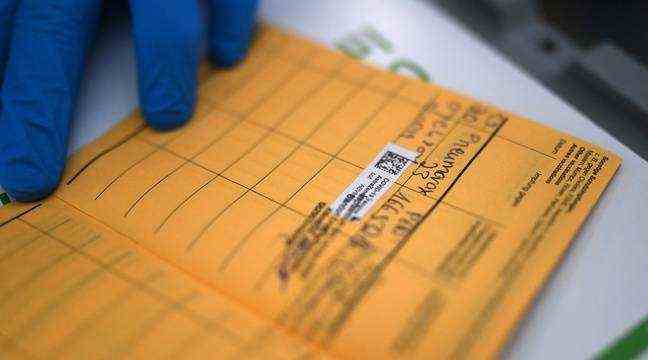A vaccination certificate with a sticker of the AstraZeneca vaccine against the coronavirus (Covid-19). – Ina FASSBENDER / AFP
- While there is a collective interest in being vaccinated, this is not always the case individually. The health pass brings an additional argument to our personal considerations.
- If this tool comes to compensate for the lack of citizen enthusiasm hoped for by the government, it also shows the failure of the latter to convince the population via arguments of a medical nature.
- However, care must be taken to ensure that this pass is not put in place too quickly at the risk of creating unfair situations between populations who have been able to have access to the vaccine and others, warn specialists.
Although vaccination against the coronavirus is not compulsory today in France, the health pass may well become essential to once again have “a normal life” and leisure. Here, it is the Union of Solidarity Professionals of Events which is considering such a pass to allow the organization of weddings. There, it is airlines that plan to impose it in order to be able to fly. Previously, restaurant representatives thought about it for customers. The track is also being considered by the government for access to cultural places.
If such a pass were to be introduced to access all these non-essential leisure activities, the life of unvaccinated people would be summed up generally to that which we currently live in confinement. A poor daily life. Is the pass ultimately a backdoor way of forcing us to vaccinate without forcing us to do so?
The balance between collective and individual good
“In the logic of collective action, we always make a rational calculation between the common good and our personal interest,” explains Caroline de Pauw, a sociologist specializing in health issues. For the vaccine, even if we have every interest in doing it collectively, we do not all have an interest in doing it individually. “There is indeed today a certain fear of the population around side effects (however rare) or the lack of perspective, which makes people with low chances of developing serious forms of Covid-19 less inclined to get vaccinated.
“But a compulsory health pass to take the plane, to go to shows, to the restaurant or to organize a wedding, it is a constraint lever which will tip the balance in which this collective interest is on one side and , on the other, personal interest, ”continues the researcher associated with Clersé (Lille Center for Sociological and Economic Studies and Research) at the University of Lille. Concretely, since our personal interests predominate, we will more easily seek a dose because “we are in a more individualized society where we make our own choices and where people find meaning when it is in their individual interest”.
Was such a constraint inevitable in France?
It’s possible. In the first place because too many French people are still in the logic of waiting and seeing. “We may tend to think that if everyone else is vaccinated, then we won’t need to do it. The logic of the stowaway, ”explains Bénédicte Campenois-Rousseau, a sociologist specializing in health issues. Clever, except that this strategy does not work if everyone has the same idea, nor if the collective immunity threshold is not reached. “In addition, it is not possible to have this kind of reflection in our situation since we do not plan to vaccinate children, in whom the virus circulates a lot. So it does not work ”, insists the expert.
The sociologist also highlights the historical mistrust of the French vis-à-vis vaccines. “Since the major health scandals of the 1980s, medicine has been called into question despite the fact that it has made enormous progress. There is also an anti-vaccine current in France which does not facilitate the task. “But given the way the virus is spreading today, for Bénédicte Campenois-Rousseau,” apart from living under a bell, getting vaccinated remains the most effective solution “.
An admission of failure
Is it therefore by constraint and not by a surge of benevolence towards the most vulnerable populations that the French will all end up being vaccinated? Caroline de Pauw nevertheless notes that this civic attitude has been particularly visible “in the entourage of people in nursing homes or transplant recipients, for example, who have voluntarily taken the step of being vaccinated to protect their loved ones”.
For the expert, being vaccinated under duress is despite everything “an admission of failure and powerlessness of the government”. “This means that he has not succeeded in convincing the population by the other levers, namely to protect others or oneself. The fault, according to her, to an absence of vaccine culture and a lack of explanations. “People are not irrational, they just need their questions and anxieties answered. Rather, we must work around the brakes of people who refuse vaccination. Otherwise, by imposing it, we risk fueling the discourse of conspirators, ”she warns.
The question of ethics and legality
Regarding the health pass, the question of the ethics around its implementation is raised by the two experts. “Ethics is based on four pillars: benevolence, non-malice, autonomy and fairness, explains Caroline de Pauw. We can ask ourselves if, when we force people, we respect their autonomy. “As for the question of equity, for Bénédicte Campenois-Rousseau,” before the implementation of this pass, it will of course be necessary to study the modalities so that there is no deprivation of chance for some ” , in order to avoid injustices. “The majority of the population must have had access to the vaccine and therefore had the possibility of accepting it or not. However, this is not the case today. “
In terms of legality, there is a precedent for vaccines. It is indeed compulsory to have your child vaccinated to enroll him in the nursery or school. On this point, the implementation of the health pass may therefore be difficult to contest.

